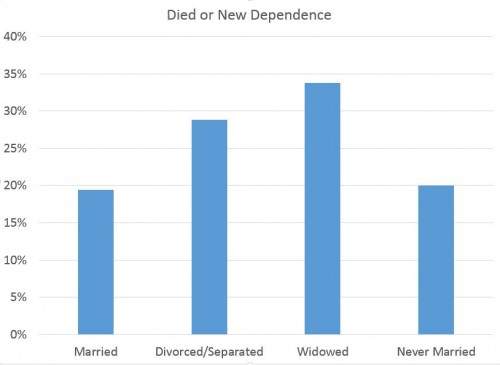I mean, if you believe epidemiological evidence translates into causality… have I got a study for you.
JAMA Surgery. “Marital Status and Postoperative Functional Recovery“:
Chances of survival after major surgery may be better among married vs unmarried persons, but little is known regarding the association between marital status and postoperative function. Characterizing the association between marital status and postoperative function may be useful for counseling patients and identifying at-risk groups that may benefit from targeted interventions aimed at improving functional recovery.
They used data from the University of Michigan Health and Retirement Study, which is a longitudinal panel survey, run since 1998, of more than 29,000 adults who are at least 50 years old. This analysis included data from four waves spread over 6 years. Specifically, they looked at patients who had received cardiac surgery while in the study.
They gathered data on age, sex, comorbidities, and pre-op dependence for many activities of daily life. They also collected marital status. The outcome of interest was death or a new dependence in one of the activities of daily life. the controlled for baseline characteristics in a logistic regression analysis.
The findings? Of the 1026 participants, 2.9% died and 21% survived but developed a new dependence. Let’s break that down by marital status;
People who were still married and people who were never married had a similar chance of a bad outcome. But if people were divorced or separated, their odds of a bad outcome was 1.55. If they were widowed, then the offs were 1.6.
Now, as an association, I can totally rationalize this. Perhaps people who never married had developed skills to function completely independently than those who had gotten married. Perhaps those who were newly not married had become dependent or symbiotic in such a way that made it hard for them to function as well indepently. Or maybe they were sad or depressed. Or maybe there’s some other factor I can’t think of that made them different. I believe the result, and I find no fault with the analysis or the paper.
But screw that. This week, a lot of people have taken epidemiologic data and argued that it’s causal. So be it. Perhaps someone or some group would like to make a proclamation for better heart health. Either never get married, or if you do, never be unmarried again. It’s going to increase your chance of a good heart health outcome by at least 50%. That’s way more than the relative risks I’ve seen others using this week.


